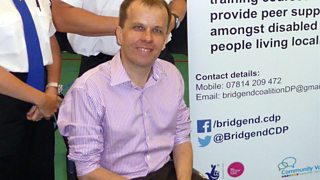
Simon Green is a 38-year-old wheelchair user from Bridgend. He explains why he feels disabled people are being failed by the justice system.
While the tragic deaths of people like Steven Simpson from Barnsley make the news and the very nasty incidents of bullying, verbal abuse and physical attacks can often be investigated, it is low level incidents that affect people more often.
I was born with a condition called neurofibromatosis – a genetic condition that causes tumours to grow along my nerves. In 2003 it got so bad that I lost the ability to walk. I’ve been a wheelchair user ever since. But there are people in my hometown of Bridgend in South Wales who don’t believe me and have no problem telling me so.
I’ve had little snide comments and on one occasion had someone repeatedly knock into my wheelchair whilst shouting ‘stand up and be counted.’ This kind of thing has horrific consequences for me and thousands of other disabled people across the UK but even when these incidents are reported, they are often treated like normal anti-social behaviour, bullying or just ‘lads being lads.’
On one occasion I was punched in the face because another pub-goer didn’t like the fact that a pretty girl was sat on my lap. On another occasion I was tipped out of my wheelchair.
I‘ve met many people with learning difficulties who have been deliberately targeted and taken advantage of. Many of them don't realise they are being used and abused or think it’s better to have friends who beat them up and are cruel to them rather than no friends at all.
I met one young lad recently who would get taken down to the pub once or twice a week and his parents were really happy, thinking he had made friends. But his ‘friends’ were stealing his money and making him buy all the drinks and often hitting him. But he wasn't used to having friends and he thought this was normal.
I know of blind people who’ve been taunted by groups of youths – tripped up, guided into lamp posts, that kind of thing.
But amongst the general public there is little known about disability hate crime and many don't think it exists - or don't like to think that it exists in 2014 - but it does. We all know that racism and homophobia occurs but most believe we are nice and polite to the disabled and not aggressive and hostile and I think these views are shared by the justice system.
That’s why we need to do so much more about tackling it and why we need to recognise it for the truly awful thing that it is. We need to encourage people to report these crimes and then deal with them appropriately.
A question I often get asked is ‘why should a crime against a disabled person be treated more seriously than a crime against someone without a disability’. My reply is always the same. If it is a random attack that has nothing to do with an individual’s disability, then sentencing shouldn't be enhanced. But if it is proven that someone was attacked or verbally abused simply because they have a learning disability or are they are a wheelchair user, the crime has a much bigger impact because it’s a personal attack on you and on who you are.
As a victim of hate crime myself I can say for 100% it has a devastating impact and takes far longer to get over so extra sentencing powers against the perpetrators is vital, but first of all we need to make more people aware of these heinous crimes.
Hear Simon’s story and more on 5 live Investigates, Sunday 21September
